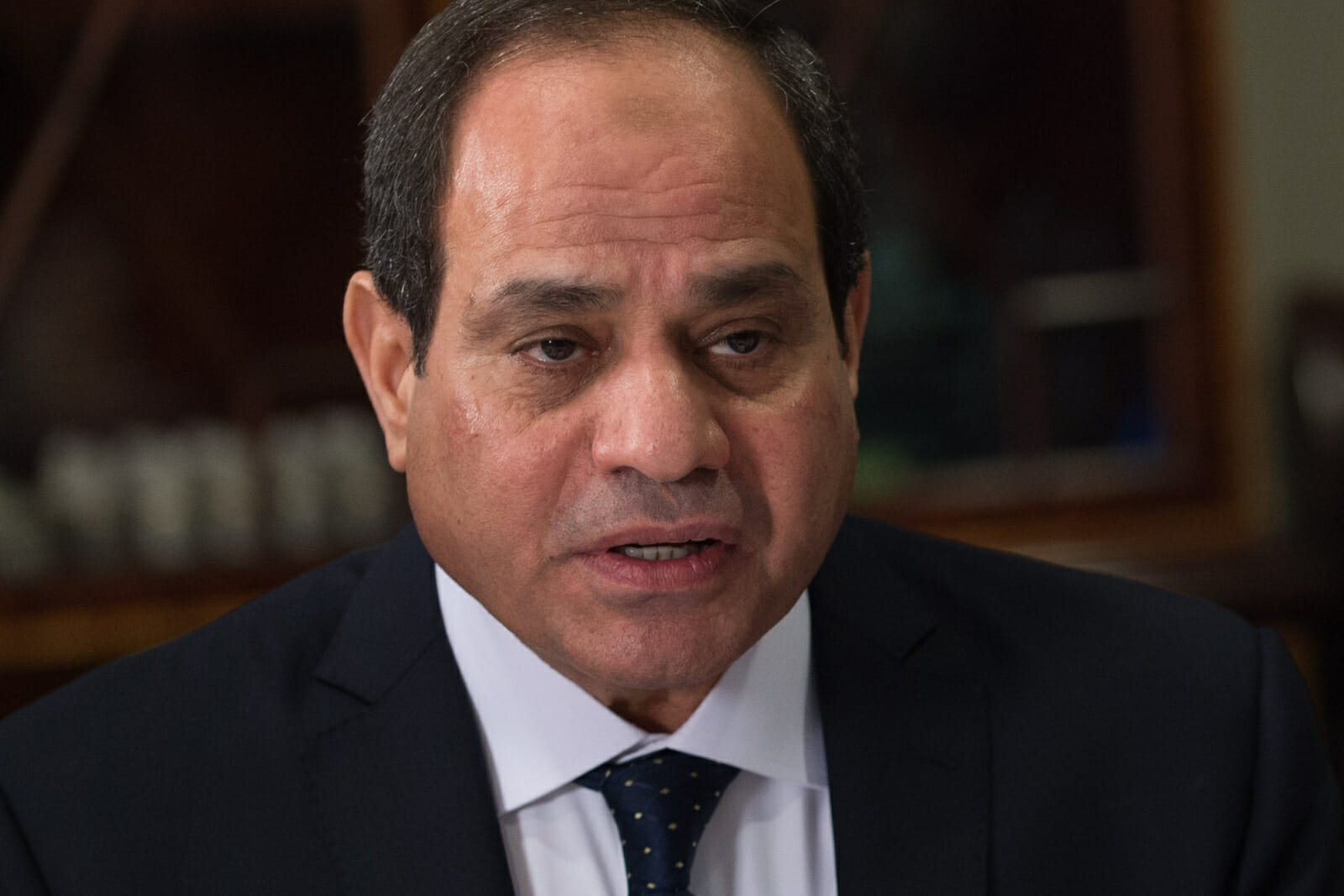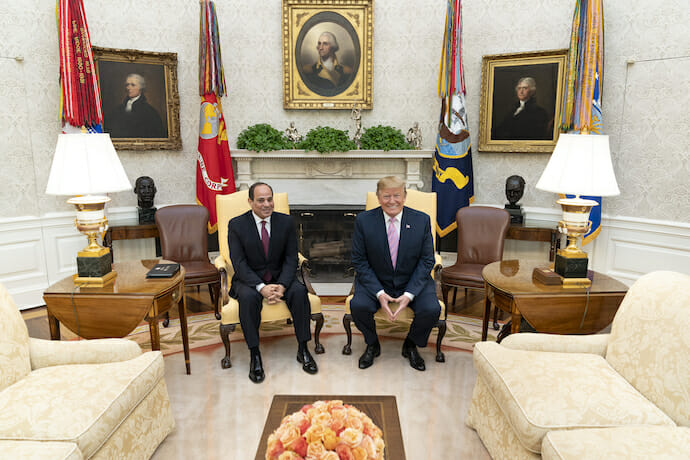
Egypt Seeks a New Role in the Greater Middle East
Last week, Egyptian President Abdel Fattah el-Sisi met with President Trump at the White House. Little news was made at the meeting and the two leaders did not even have a joint press conference after their meeting, although they both issued short press statements. Sisi described Cairo’s relations with the US as “strategic” as the Trump administration “improves US-Egyptian relations.”
Bilateral ties between Egypt and the US date back to the days of the Cold War, when Egypt, under the leadership of President Anwar Sadat, shifted strategically from an antagonistic position vis-à-vis Israel to normalizing bilateral ties with Israel by signing a peace treaty under the supervision of Washington in return for American military support. But relations faced a frosty time under President Obama when the Arab Spring toppled long-time American ally Hosni Mubarak and replaced him with a new Muslim Brotherhood government that was subsequently replaced by a military coup a year later. The new regime’s human rights record, as well as some of its domestic policies, served as a challenge to the Obama administration.
But it seems that the Trump administration is improving ties between the two countries at a time when President Sisi seems committed to playing a more active role in the greater Middle East after nearly a decade of political turmoil in Egypt. However, this does not mean that the two countries are aligned on every subject. The recent US decisions regarding Jerusalem and the Golan Heights were not received positively in Cairo, as Egypt’s new decision to procure Sukhoi-35 fighter jets from Russia may result in US sanctions against Egypt in the near future under the Counter America Adversaries Through Sanctions Act (CAATSA).
For starters, as the most populous Arab country in the world, Egypt has traditionally played a central role in Arab affairs. Since the Arab Spring, Egypt has looked inward as its economy has contrasted and the Arab world witnessed a strategic shift in the balance of power, one from which Egypt used to lead into one that Saudi Arabia, Qatar, and the UAE play a more central role. As the region is realigning once again, Cairo is trying to navigate a new role, one in which it is closely aligned with Saudi Arabia and the UAE, while at the same time it plays a more independent role in regional affairs. The following issues indicate Cairo’s effort to seek a more independent policy to demonstrate its role as a regional power in the Middle East and North Africa.

First, Cairo’s new selective role in some important Middle Eastern issues that affect its interests, while avoiding being trapped by its alliance with Saudi Arabia in order to avoid being overstretched. Two important areas where this new Egyptian policy could be seen are in Libya and in the Arab-Israeli peace process, where Cairo is playing a central role to support US efforts to reach a ‘deal of the century’ between the two sides. The plan is expected to be published in either May or June.
In Libya, Egypt is playing a central role by supporting Khalifa Haftar and his forces against the UN-backed national government. As Haftar announced his intention to take over Tripoli, Sisi is the only head of state who has hosted Haftar thus signaling Egypt’s intention to have a strong ally in Libya, in order to avoid militant groups that could potentially be based in Libya. A statement from Egypt’s government did not mention current tensions in Libya, but it emphasized Cairo’s support “for efforts to combat terrorism in order to achieve stability for the Libyan people.”
But as Cairo is engaged in Libya, another theater in the Middle East that Egypt has not engaged in is Yemen, where a Saudi-led coalition has been fighting the Iranian-backed Houthis for close to five years. One could explain the reason Egypt is playing a key role in Libya while avoiding being directly involved in Yemen is that the leaders in Cairo are using their limited resources to achieve a more stable and secure Egypt. After all, Egypt is currently engaged in a military conflict with terrorist groups in the Sinai and there could be the potential for cross-border terrorist attacks by groups based in Libya. So addressing Libya is a key national security issue for Cairo, while Yemen does not currently pose a threat to Cairo.
The second is Egypt’s recent decision to withdraw from the US-backed Middle East Strategic Alliance (MESA). Although this decision was not officially announced by either the Egyptian government nor by the other members of the MESA alliance, Reuters reported after Sisi’s meeting with Trump that Egypt has officially ‘pulled out’ of the US effort to establish this alliance. Although the strategic alliance’s intentions are not clear and it faces many challenges, including the internal divisions of its potential members, one of the many issues that the alliance could align with is countering Iran’s growing regional influence in the Middle East – a top priority for the Trump administration. Cairo’s withdrawal is due to “its doubt on the seriousness of the initiative” and its potential to “increase tensions with Iran” among other concerns.
Reuters reports that it raises the question of whether or not Egypt shares the same strategic threat assessment with its other partners in the gulf when it comes to Iran, although it seems highly unlikely that Cairo will push for a new rapprochement with Iran. Both Saudi Arabia and the United Arab Emirates consider Iran a strategic adversary to their regional role, and countering Iran among other groups is on the top of their foreign policy objectives. But as one Egyptian journalist has argued before, Egypt is “not willing to put all the eggs in one basket, through being fully aligned with a country or a group of countries due to the fact that having alternatives always indicates one’s power.” The new role that Cairo seeks to play in the Middle East is one that is more independent instead of subordinate to other Arab countries. The failure to raise the issue of Iran or the prospect of MESA in Trump’s press briefing with the Egyptian leader before their meeting also signals the concern that Egypt is not prepared to join an anti-Iran coalition.
While Egypt’s role in the region is not clear to many, and the economic problems, as well as the ongoing battle with extremist groups in the Sinai peninsula, serves as a challenge to Egypt’s commitment to play a role in regional affairs, Egyptian leaders are ready to capitalize on its strategic significance as both the most populous Arab nation and its control of the Suez Canal, an important waterway for international commerce. For these two reasons, Cairo will still be a significant player and other global powers will consider its interests, and it will also try to play a more independent role from time to time.

